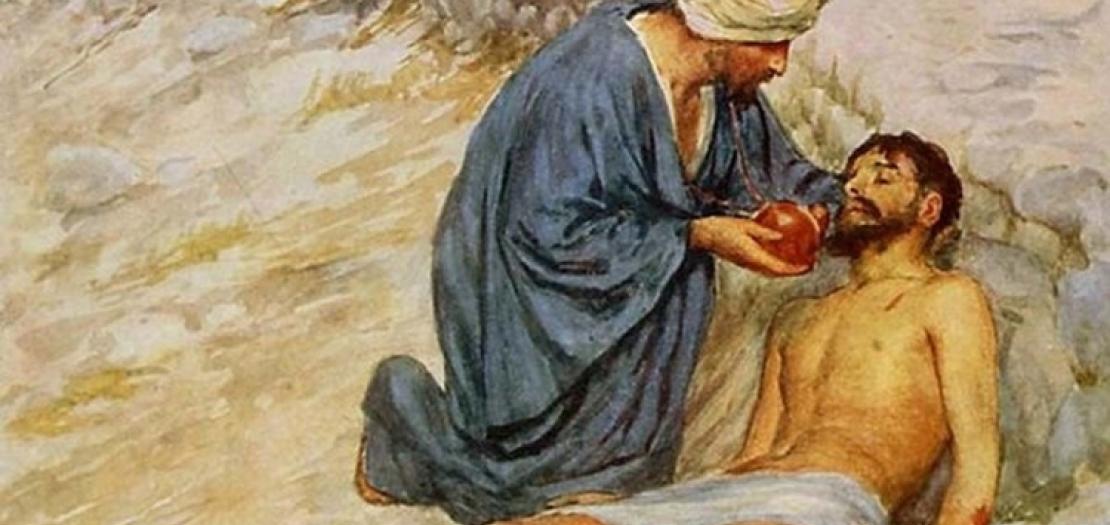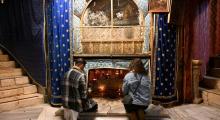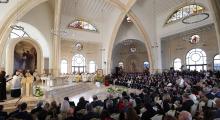Issued by the Catholic Center for Studies and Media - Jordan. Editor-in-chief Fr. Rif'at Bader - موقع أبونا abouna.org

Following is the text of meditation by Cardinal Pierbattista Pizzaballa, Latin Patriarch of Jerusalem for the 31st Sunday of ordinary time, dated November 3, 2024:
Last Sunday we saw that for Jesus, loving a person means stopping before him and for him - Jesus is in Jericho and on his way to Jerusalem to give his life.
But on this journey, giving life means for Jesus that he stops and takes the pain of this person to heart, that of Bartimaeus, who cries out and turns to him in order to be able to see again. Jesus stops, meets him and heals him.
So, loving also means stopping and listening, taking the pain to heart.
In today's passage, we see that Jesus has come to Jerusalem. It is the city to which one goes up, where love for God finds concrete and visible expression: offering worship and sacrifice to the one God and Lord.
The passage, moreover, is set precisely in the temple, the place where God dwells and which people enter to worship him.
We are in Mark chapter 12. The previous chapter describes Jesus’ solemn entry into the Holy City. In the days following his entry, he goes to the temple and enters into a dialog with the religious leaders, with the scribes, who have basically already decided to kill him. And the dialogs that Mark reports do not make his situation any better. Jesus speaks freely, and that certainly does not help to put him in a good light. But once again, Jesus remains steadfast and does not flee from the encounter with those who are hostile to him.
It is in this context that the evangelist Mark places the dialog between Jesus and a scribe who asks him which is the first commandment: “Which commandment is the first of all?” (Mark 12:28)
The answer would basically be simple: the first commandment is to love God.
But Jesus does not leave him at this first answer, as if to say that this answer alone is somehow incomplete, and he adds what the second is: “The second is this, ‘You shall love your neighbor as yourself.’ There is no other commandment greater than these.” (Mark 12L:31)
It is not enough to go to Jerusalem, enter the temple and give God the glory. The fullness of the law is not only in this. The fullness of the law also passes through Jericho and demands that you stop before the pain of a poor man who has nothing and counts for nothing in the eyes of the people. You cannot go up to Jerusalem without going through Jericho.
It is often easy for us to choose something and exclude something else and try to simplify life by excluding something that makes life and love complicated.
While it is true that the goal of everyone’s journey is to get a heart that is able to love, the risk is in keeping the spheres and spaces separate: I can choose to love God without caring at all about the people around me. Or, conversely, I can love people passionately and keep God out of my heart, as if God has nothing to do with caring for the poor. As if we absolutely have to choose.
Instead, Jesus asks us to exclude neither the one nor the other, because these two loves are not antagonistic, they are not at war with each other. On the contrary, neither of these two loves is sufficient on its own, for the simple reason that God and man are united by a deep bond, by a mysterious unity: One cannot love the one without also loving the other. God does not want to be loved alone.
It is interesting that the scribe not only agrees with Jesus, but also adds his own comment: Loving in this way is worth more than all burnt offerings and sacrifices: “You are right, Teacher… ‘to love him with all the heart, and with all the understanding, and with all the strength,’ and ‘to love one’s neighbor as oneself,’—this is much more important than all whole burnt offerings and sacrifices.” (Mark 12: 32-33)
When we remember that these words are spoken in the temple and that much of Israel's religiosity revolved around burnt offerings and sacrifices, we see that this scribe is indeed not far from the kingdom of God. (Mark 12:34) For the kingdom of God is precisely this experience of a freely received love that is simply to be shared with all those who, like Bartimaeus, sit by the roadside and ask for mercy.
+ Pierbattista
 Jerusalem: Augusta Victoria Hospital offers free treatment for Gaza children diagnosed with leukemia
Jerusalem: Augusta Victoria Hospital offers free treatment for Gaza children diagnosed with leukemia  Text of meditation by Cardinal Pizzaballa, Latin Patriarch of Jerusalem, for second Sunday of Christmas
Text of meditation by Cardinal Pizzaballa, Latin Patriarch of Jerusalem, for second Sunday of Christmas 




